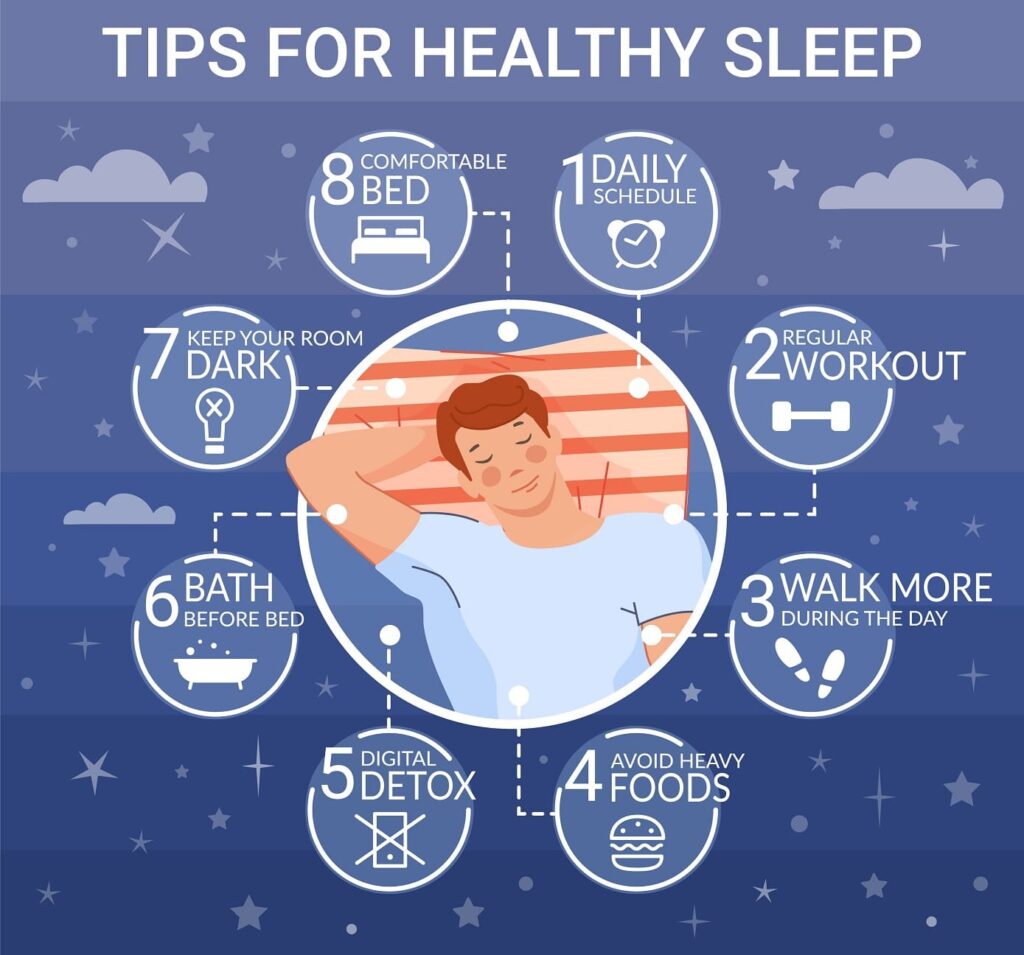In today’s nonstop world, sleep often takes a backseat to deadlines, social media, and late-night Netflix binges. But here’s the truth: quality sleep isn’t a luxury—it’s a necessity. And it’s not just about how many hours you get, but how well you sleep. The good news? A few intentional changes in your bedtime habits can make a big difference.
Let’s talk about how to sleep smarter.
🌙 Why Sleep Should Be a Priority
Sleep is when your body and brain perform some of their most important work. It’s the time for physical repair, memory consolidation, emotional processing, and immune strengthening. Skimping on sleep—or getting poor-quality rest—can lead to fatigue, irritability, trouble focusing, weight gain, and even long-term health issues.
If you’re feeling tired but wired, struggling to fall asleep, or waking up feeling unrested, your sleep habits might need a tune-up.

🛌 7 Smart Bedtime Habits for Better Rest
1. Stick to a Consistent Sleep Schedule
Your body thrives on rhythm. Going to bed and waking up at the same time every day—even on weekends—helps regulate your internal clock and makes it easier to fall asleep and wake up naturally.
2. Create a Calming Wind-Down Routine
Ease your body into rest mode with a relaxing bedtime ritual. Turn off bright screens an hour before bed and opt for calming activities like:
- Reading a book
- Listening to soft music or nature sounds
- Gentle yoga or stretching
- Journaling or meditating
Avoid intense workouts or mentally stimulating tasks right before bed.
3. Keep Your Sleep Space Cool, Dark, and Quiet
Set the stage for rest by creating a sleep-friendly environment. Try:
- Blackout curtains to block light
- A fan or white noise machine to drown out sounds
- A room temperature around 60–67°F (15–19°C)
- Comfortable pillows and breathable bedding
Your bedroom should be a sanctuary for sleep—not for work or late-night scrolling.
4. Watch What You Eat and Drink
What you consume matters. Avoid caffeine in the afternoon, heavy meals close to bedtime, and too much liquid late in the evening. While alcohol might make you drowsy, it can interrupt your sleep cycle later in the night.
5. Limit Screen Time Before Bed
Blue light from phones, tablets, and computers can suppress melatonin, the hormone that helps you fall asleep. Try powering down electronics at least 30–60 minutes before bed, or use blue-light filters and night mode settings.
6. Get Morning Sunlight
Natural light in the morning helps regulate your circadian rhythm, making it easier to feel alert during the day and sleepy at night. Try to spend at least 10–20 minutes outdoors soon after waking up.
7. Don’t Force It
If you can’t sleep after 20–30 minutes, get out of bed and do something relaxing in dim light. Lying in bed wide awake can create anxiety, which only makes it harder to drift off.
💤 Sleep Is a Skill—You Can Learn It
Improving your sleep doesn’t have to be overwhelming. Start with one or two small changes and build from there. Over time, your body will adjust, and sleep will become something you look forward to—not something you struggle with.
Better rest means better days. So tonight, skip the doomscrolling, sip some herbal tea, and set yourself up for the deep, restorative sleep you deserve.
- Magnesium: Helps raise melatonin/GABA, lowers adrenaline, relaxes muscles
- Vitamin B1 (Thiamine): Supports nerve function, stress response, melatonin production—deficiency may disrupt sleep cycles
- Lifestyle & Diet:
- Avoid late sugar or carbs—these spike cortisol and disrupt sleep
- Align meals and exercise: High intensity late workouts may boost cortisol; morning workouts and evening walks foster better sleep
- Light exposure: Morning sunlight regulates circadian rhythm and melatonin release; reduce blue light exposure at night.
During sleep our bodies perform critical tasks:
- Burn fat
- Detoxify both body and brain
- Repair tissues
He warns that lack of adequate sleep (5 hrs or less) leads to sympathetic nervous system “overdrive”—higher cortisol & adrenaline—which raises blood sugar, impairs weight loss, and stresses the heart, increasing risks of stroke and diabetes.
Sleep stimulates growth hormone, essential for immune proteins, and supports macrophages—key cells that clear infections. Chronic sleep loss raises cortisol/adrenaline, suppressing immunity
Sleep helps consolidate memory, learning, decision-making
It regulates mood by balancing neurotransmitters and stress hormones
Chronic sleep deprivation impairs focus, memory, and emotional stability
Sleep is a foundational pillar of health—not optional. Quality rest boosts immunity, brain function, metabolism, mood, and weight loss. He offers clear, actionable strategies: support sleep with minerals like magnesium and thiamine, align your circadian rhythm with natural light, eat appropriately, exercise smartly, and wind down effectively.
Need help building a bedtime routine that works for your lifestyle? Leave a comment or reach out—we’re here to help you sleep smarter, not harder.




Pingback: 10 Habits of People Who Never Get Sick - Do it yourself Live Life